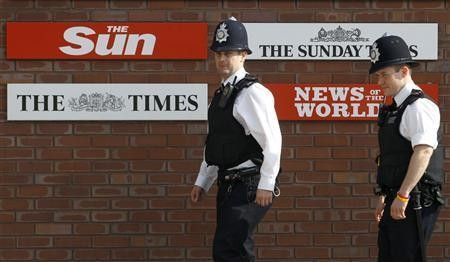British Police May Be Forced To Scale Back Controversial Stop-And Search Tactics Which Disproportionately Target Ethnic Minorities

As the City of New York wrestles with the issue of police stop-and-frisk -- a practice that many believe is racially biased, since the overwhelming majority of target ‘suspects’ questioned are black or Hispanic, the Metropolitan Police of London, England is dealing with something similar.
Theresa May, the Home Secretary, has told MPs that the “stop-and-search” policy used by police officers in England and Wales should be revised in order to make it more efficient and perhaps scaled back. Typically, a British police officer can question anyone on the street if he or she has “reasonable grounds” that the person under suspicion is carrying weapons, drugs, or stolen property, etc. However, the search does not constitute an arrest.
Noting that the police make about one million stop-and-searched annually, she said that less than one-tenth of them lead to an arrest, suggesting the practice wastes time and resources. She also declared that such stops should not be based on race or skin color. "I want to make sure that stop-and-search is used fairly and in everybody's interest. I want to see stop-and-search used only when it's needed," she said in her speech at the House of Commons. "I want to see higher search-to-arrest ratios. I want to see better community engagement and I want to see more efficient recording practices across the country.”
She cited that an average stop-and-search maneuver takes about sixteen minutes, which, she claimed, translates into 312,000 hours annually – or the equivalent of 145 full-time policemen doing nothing else all year. "At its best, stop and search is a vital power in the fight against crime,” May added. “At its worst, it's a waste of police time and serves to undermine public confidence in the police.”
May also conceded that Britain’s ethnic minorities, namely blacks and Asians, are subject to excessive searches by police and that situation must be remedied. According to a report in the Guardian, blacks are subject o "routine" street searches at five times the rate of white people. However, under something called ‘section 60 searches’ (where police are permitted to search anyone in a situation where they believe violence will take place, for example, at football matches), the police target blacks up to 25 times they do for whites. "The official statistics show if you're from a black or minority ethnic background, you're up to seven times more likely to be stopped and searched by the police than if you're white,” she conceded. "We shouldn't rush to conclusions about those statistics, but everybody involved in policing has a duty to make sure that nobody is ever stopped just on the basis of their skin color or ethnicity."
As in New York, London police may be concerned that a reduction in stop-and-searches could lead to the failed prevention knife crimes and even terror acts, particualry in light of the widespread urban rioting in the summer of 2011.
Britain’s Equality and Human Rights Commission (EHRC), which believes that stop-and-search may be “potentially unlawful,” advocated that police should stop people based on evidence, not on intuition. In a report, EHRC stated that when police forces use an approach “based on evidence rather than hunches or generalizations, they have not only seen reductions in crimes rates in line with overall trends, but have also increased public confidence in the police.”
© Copyright IBTimes 2024. All rights reserved.





















